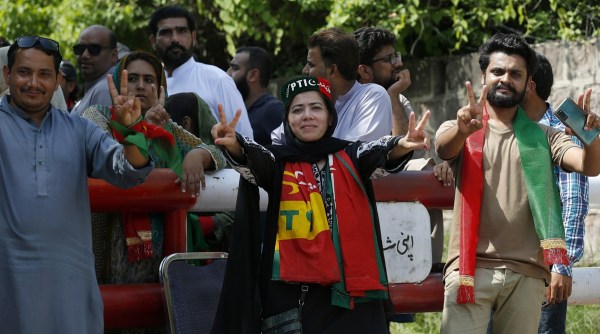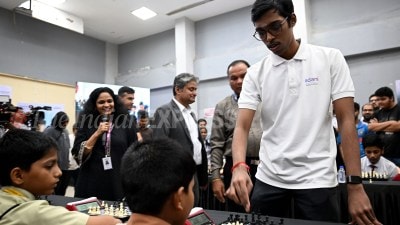Explained: Terror charge on Imran Khan and the new political flashpoint in Pakistan
Political tensions in Pakistan escalated on Monday as police announced they had filed terrorism charges against ousted premier Imran Khan. What led to this flashpoint? Where is Pakistan headed next?
 Pakistan's former Prime Minister Imran Khan, center, addresses during an anti-government rally in Islamabad, Pakistan, Saturday, Aug. 20, 2022. (AP Photo/W.K. Yousafzai)
Pakistan's former Prime Minister Imran Khan, center, addresses during an anti-government rally in Islamabad, Pakistan, Saturday, Aug. 20, 2022. (AP Photo/W.K. Yousafzai)Political tensions in Pakistan escalated on Monday as police announced they had filed terrorism charges against ousted premier Imran Khan for allegedly threatening public officials in a speech during a rally on Saturday. As Imran’s party, the Pakistan Tehreek-e-Insaf (PTI), warned of nationwide protests if he was arrested, hundreds of his supporters gathered around his residence to prevent their leader from being taken into custody. Meanwhile, Imran moved Islamabad High Court, and was granted pre-arrest bail until August 25.
What led to this flashpoint?
The crisis began after a key Imran aide, Shehbaz Gill, was arrested on August 9 over comments made on TV, which the country’s media regulator, the Pakistan Electronic Media Regulatory Authority (Pemra) termed “seditious” and tantamount to inciting “armed forces towards revolt”.
The PTI has since claimed that Gill has been tortured in custody and his life remains in danger. In his rally on Saturday, Imran attacked a judge who had approved 48 hours’ physical remand for Gill, and vowed to file cases against top officials of the Islamabad police.
Soon afterward, the former PM was himself booked under Section 7 of the Anti-Terrorism Act (punishment for acts of terrorism) for “terrorising” the police and judiciary in his speech.
What does Imran Khan want?
Eager to ride the present momentum in his favour, the former PM is pushing for early elections. While his popularity was down in the run-up to his ouster in April, that changed dramatically after he was voted out in a no-confidence motion that he successfully managed to paint as “orchestrated”.
 Supporters of former Pakistan PM Imran Khan outside his residence in Islamabad on Monday. (AP Photo)
Supporters of former Pakistan PM Imran Khan outside his residence in Islamabad on Monday. (AP Photo)
His dramatically-delivered narrative of the US-dictated “regime change”, which claimed he was kicked out for pursuing an independent foreign policy, struck a chord with his supporters, most of whom are young and belong to the Pakistani middle class.
The PTI chairman has since used the same line of argument to question the “neutrals” — a euphemism that he uses for the army — for their alleged role in propping up the PML-N-PPP regime of Prime Minister Shehbaz Sharif.
He has backed this up with his talk of building a “Naya Pakistan” that is rid of corrupt politicians. The PTI has won resounding victories in bypolls in the Pakistani province of Punjab, the home turf of the Sharifs, which has rattled his political opponents.
By continually upping the ante through his well-attended marches and rallies, Imran not only aims to deligitimise the regime that replaced him, he also hopes that the pressure would help advance the scheduled elections to the National Assembly.
What position has the Pak army taken?
In the remarks that got him into trouble, Gill said that the lower and middle rungs of the army and their families were firmly behind Imran, and that this had angered the government. The PTI continues to count on the backing of a section of the Pakistan army.
Even before he lost power, the former PM was speculated to have tried moving the pieces to get a loyalist, then-ISI chief Lt Gen Faiz Hamid, as the next army chief. This involved refusing to confirm Army Chief Gen Qamar Javed Bajwa’s appointment of Lt Gen Nadeem Ahmed Anjum as the next ISI chief for three weeks. Until then, the Bajwa-Faiz-Imran trio was considered to be working together to preserve the Pakistan army’s “hybrid” regime experiment, which had brought the PTI to power in 2018.
But in the end, Imran’s attempt to create a power centre in the army loyal to him cost him the support of his military benefactors, and his job as PM.
Now, even as there is talk of Imran continuing to enjoy some army support, there is also a view that the military would not want the PTI to sweep the next elections, whenever they are held, as it would be difficult to exercise control on such a popular regime.
 Police officers escort Shahbaz Gill after a court appearance, in Islamabad, Pakistan, Monday, Aug. 22, 2022. (AP/PTI Photo)
Police officers escort Shahbaz Gill after a court appearance, in Islamabad, Pakistan, Monday, Aug. 22, 2022. (AP/PTI Photo)
Where is Pakistan headed next?
There are two key milestones to watch out for as the current crisis plays out. First is the approaching date when the current army chief’s tenure ends. COAS Bajwa is due to retire in November this year. But he may still have a shot at an extension as he is 61 years old, and the age by which an army chief must be retired in Pakistan is 64.
The picture is likely to be clear by mid-September. It is not clear how Imran plans to script the victory he hopes for if Bajwa continues, or cleans the army stables before stepping down.
The other important milestone is the general election that is due to be held next year. The Election Commission of Pakistan had in April declared that it would not be in a position to conduct polls before May 2023. The ECP plans to begin a delimitation exercise based on a special census in January, and wrap it up in three months.
In the meantime, pitched political battles are expected to continue on the streets and through institutions, which are known to take sides in Pakistan’s power tussles.
The ECP recently ruled that the PTI received foreign money, which is illegal in Pakistan. The ruling could result in the party being banned from politics, something that Imran’s opponents are already demanding.
Imran has made it clear that his party will continue protesting until polls are announced. The PML-N, in turn, has been accusing him of trying to challenge “the writ of the state by inciting rebellion”.
One X-factor could be the return of former PM Nawaz Sharif to Pakistan from London. While it may energise the PML-N rank and file, the army’s entrenched distrust for the older Sharif, and its backing of current PM Shehbaz Sharif, might queer the party pitch.
Another variable is Pakistan’s precarious economic situation. The ruling dispensation blames PTI and Imran for the current financial mess, but on the flip side, it may not have enough time to script a turnaround before going into an electoral battle.
- 011 day ago
- 021 day ago
- 031 day ago
- 0413 hours ago
- 0515 hours ago






































